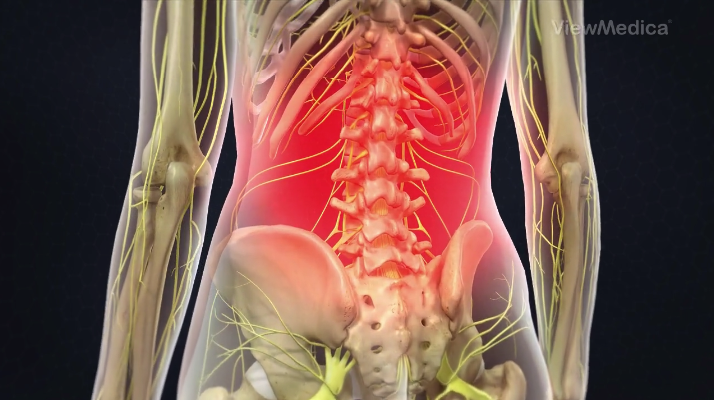This content was medically reviewed by Baher S. Yanni, MD, on July 23rd, 2019.
When you were out and about earlier today, you suddenly felt a bit of pain in your neck and lower back. You try to rub it out, but you just can’t seem to shake that tingling, burning sensation. While it’s tempting to try ignoring these warning signs, your body is likely sending you warning signs that you have a pinched nerve.
Pinched nerves happen when there’s pressure on a nerve, often caused by performing repetitive tasks or holding your body in a single position for too long, like when you’re asleep. Nerve damage often occurs in the narrow spaces of your body, where there’s little soft tissue to protect them — this often happens in ligaments, tendons and bone. The damage caused by a pinched nerve may be minor and easily treatable or severe and at risk for causing long-lasting problems. The earlier you can recognize the signs of a pinched nerve and receive a diagnosis and treatment plan, the more comfortable you’ll be in the long run.
Common Symptoms of Pinched Nerves
Pinched nerves are most often accompanied by pain. If the nerve compression lasts for a long time, there may be fluid buildup at the site causing swelling, extra pressure or scarring. Besides obvious pain in your neck or extremities, compressed nerves may also cause the following symptoms:
- A sharp, aching pain that radiates outward
- Numbness or tingling at or around the site
- A feeling that your foot or hand has “fallen asleep”
- A burning or tingling sensation
- Weakness while performing certain activities
You’ve Got a Pinched Nerve — Now What?
When you suspect you may have a pinched nerve, don’t just pop some over-the-counter pain relievers and wait for the pain to slowly die down. Instead, schedule an appointment with your family physician to determine the cause and figure out proper treatment options. Pinched nerves that go untreated can lead to more severe conditions like peripheral neuropathy or carpal tunnel syndrome.
To help treat the pain and shrink the swollen tissue around the nerve, your doctor may recommend:
- Taking nonsteroidal anti-inflammatory drugs like aspirin or ibuprofen or oral corticosteroids to help reduce site swelling
- Having steroid injections to reduce swelling and facilitate nerve recovery
- Scheduling physical therapy appointments with a focus on stretching and strengthening your muscles
- Wearing a splint to help limit motion in the area and encourage the muscles to rest for brief periods of time
- Surgery, if the pinched nerve doesn’t respond to alternative types of treatment
Visit Spine INA Today for Solutions to Ease Your Pinched Nerve Pain
At Spine INA, we care about our patients and are committed to helping alleviate any pain they may be in. We’re the most knowledgeable and dedicated medical specialists working with residents throughout the New Jersey area — our attention to detail and compassion for our patients helps us properly determine what is causing your specific pain and then develop effective treatment solutions for long-term comfort and wellness.
If you suspect you may be suffering from a pinched nerve, contact us today to learn more and schedule an appointment. Call us at (609) 371-9100 to speak to a specialist or complete our online form to request an appointment.
This content was medically reviewed by Baher Yanni, M.D, on July 23rd, 2019.










